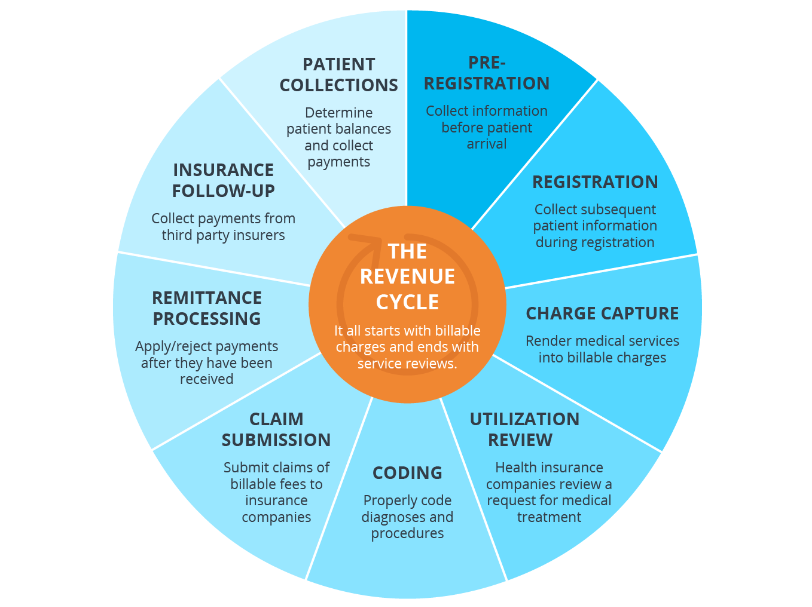Key Strategies to Optimize Revenue Cycle Management in Healthcare

Table of Contents
What is Revenue Cycle Management in Healthcare?
Definition and Importance
The expression “revenue cycle management” ( RCM) in the health care sector refers to the entire procedure of managing the financial transactions between healthcare providers the patients and healthcare payers throughout the patient’s experience. It plays an important role in the long-term viability and effectiveness of hospitals in ensuring that they can add timely and exact income collections. An efficient RCM is crucial to optimize cash flow and increasing income in the healthcare industry.
Components of Revenue Cycle Management
The different elements of managing the revenue cycle comprise different stages of administration, including registration of patients, confirmation of insurance coverage and code and the submission of billing claims, the payment posting and the managing accounts payable. Every component is interconnected, and forms component of the efficiency of revenue cycle of healthcare practices.
Common Challenges in Revenue Cycle Management
Revenue cycle management specialists must face a variety of issues including denied claims, losses of revenue due to incorrect coding or inefficient processes for billing and delayed payment from payers. These issues could hinder improvement of the revenue cycle, and adversely affect the financial health of healthcare facilities.
What are Key Strategies for Effective Revenue Cycle Management?
Data-Driven Approaches
Solutions that are data-driven make use of the ability of analytics and technology to analyze the performance of the revenue cycle and identify areas where they could be enhanced. Through the utilization of data, health care providers can take well-informed decisions that streamline the billing process and boost the revenue collection.
Streamlining Billing Processes
To streamline billing processes, it’s essential to streamline the workflow of billing and code in order to minimize errors and improve the effectiveness of reimburse. Automating tools allow for the automation of repetitive work processes as well as less manual work and can mean speedier claim processing, and a greater liquidity.
Utilizing Automation and Analytics
Automation and analytics can be crucial to maximizing the efficiency of revenue cycle efficiency by increasing efficiency in operations as well as the accuracy of billing, coding, as well as the handling of the claims. Technology solutions can greatly improve the effectiveness of management as well as help health care organizations achieve the goal of managing revenues.
How to Optimize Revenue Cycle Performance in Healthcare Practices?
Effective Denial Management
Denial-management that is effective involves the identification and correction of the denial of claims as soon as is possible in order to prevent losing of revenues. Through addressing the reason for denial, and making corrective steps health care providers are able to simplify the reimbursement process and improve the productivity of the income cycle.
Implementing Key Performance Indicators (KPIs)
The creation of key Performance Indicators (KPIs) helps hospitals in evaluating and monitoring their performance in revenue cycles according to their pre-determined objectives. Monitoring KPIs helps in making proactive decisions and continual improvement in managing revenues cycles.
Leveraging Technology for Revenue Cycle Optimization
Utilizing the latest technology, such as Software for managing revenue, it allows healthcare specialists to automatize repetitive tasks to reduce the likelihood of making mistakes manually and rise the effectiveness of collecting revenue. Through the advancements in technology, health professionals can achieve 100% success with revenue cycles management outcome.
What Role Does Billing Play in Revenue Cycle Management?
Importance of Accurate Coding and Billing
A correct billing and coding is vital to the proper management of revenue cycle management because they ensure the accuracy of reimbursements and prompt payments by your payers. Uncorrected billing and coding processes could result in claims being refused, and revenue being lost and impede the flow of cash for the healthcare industry.
Handling Claim Denials and Reimbursement Processes
The successful handling of denials to claims and reimbursement processes is a matter of proactive planning and effective communication with paying parties. With the ability to resolvedenial issues swiftly, as well as ensuring that the outstanding claims are dealt with, healthcare providers are able to increase outcome in the revenue cycle and reduce losses in revenues.
Improving Cash Flow Through Efficient Billing Practices
To increase cash flow, it’s vital to improve the process of billing to increase cash collection as well as reduce the time it takes to collect. Healthcare companies could boost cash flow with efficient billing processes by making use of technologies for automated processes in addition to providing prompt monitoring of accounts payable.
How Can Healthcare Providers Improve Patient Satisfaction Through Revenue Cycle Management?
Enhancing Patient Registration and Verification Processes
Enhancing the procedure of registration and verification could improve the user experience in general and reduce administrative inefficiencies. In streamlining the registration process and providing precise insurance information, healthcare professionals could improve the level of satisfaction with their customers and confidence when it comes to billing.
Providing Valuable Insights to Patients Regarding Insurance and Billing
Offering patients useful information on billing the insurance company, as well as estimates of expenses assists patients in making educated decisions regarding their health options. A clear communications with patients as well as information about billing concerns can increase the level of satisfaction for patients and increase confidence in the health care provider.
Ensuring Smooth Accounts Receivable and Payment Processes
Make sure receivables are in order and the processing of payment requires timely billing, accurate payments as well as efficient follow-up on outstanding amounts. Through maintaining regular communication with the patients and offering numerous payment options health experts rise customer satisfaction and foster positive interactions across the income cycle.


